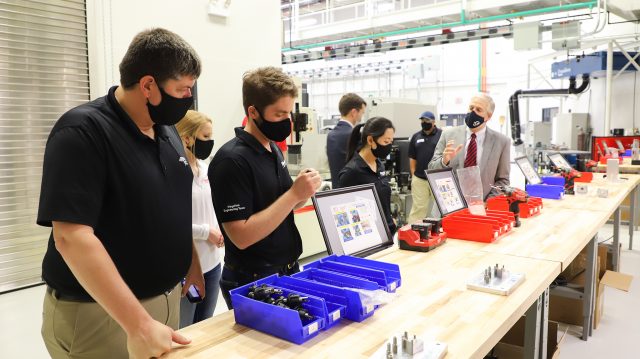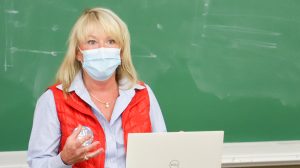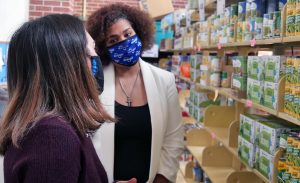
Scott Kilpatrick (right), interim executive director of the Haley Barbour Center for Manufacturing Excellence, gives a tour to leaders from Milwaukee Tool during a campus visit following the company’s announced expansion in Mississippi. Photo by Kirsten Faulkner/University Development
OXFORD, Miss. – New and strengthened partnerships at the University of Mississippi are supporting the needs of business and industry and helping address their challenges, all while influencing the next generation of leaders.
The value of such partnerships was elevated further as COVID-19 rocked all aspects of everyday life, said Hughes Miller, director of industry giving and engagement in the Office of University Development. Ole Miss and industries partnered to tackle challenges amplified by the pandemic, from food insecurity on campus to small-business hardships along the Gulf Coast.
“Ole Miss students also have had the opportunity to research, problem solve and consult with businesses that were thinking ahead to long-term shifts in industry,” Miller said. “This included experiential learning both in the classroom and on-site, introducing students to diverse industries such as manufacturing, supply chain, technology, insurance and hospitality.”
The more focused approach to partnerships began more than two years ago, when the university hired Miller, who founded and leads the UM Industry Engagement Council.
“The university committed to more strategically align with industry,” Miller said. “The steps taken then strengthened relationships with Ole Miss’ strongest industry partners and also established news ones, bolstering collaboration during the unexpected challenges of 2020 and 2021.
“We are grateful for these partnerships that have supported the campus community, research and community engagement.”
Campus Connections
One of the most common ways businesses partner with the university is by connecting with students directly in the classroom. Students research projects, participate in hands-on workshops and learn about in-demand fields and the skills required for success.
In the School of Business Administration, a recent class connected students to real-world challenges by having them consult directly with companies – researching and collaborating to advance corporate goals as part of their coursework at Ole Miss. Student teams partnered with prominent Mississippi companies, including Ergon and Dunlap and Kyle, as well as companies in the broader region, such as RJ Young in Nashville, Tennessee, and Mylo in Kansas City.
RJ Young flew its student team to Nashville to meet with company leaders and have a stronger introduction to the company.

Emily Lauder, vice president of administration for Toyota Mississippi, participates in a panel on leadership and Mississippi industry at School of Engineering. Photo by Kirsten Faulkner/University Development
“The students did a remarkable job,” said Chip Crunk, president and CEO of RJ Young. “Their data and findings were very well thought out. Their creative recommendations were insightful – from out-of-the-box ideas to the practical.
“I feel it’s a win-win exercise. It exposes the students to real-world business and all that goes with running one.”
To encourage industry partnerships with the School of Engineering, Dave Puleo, dean of engineering, regularly engages with business leaders at companies across the Southeast. Four such professionals from Ingalls Shipbuilding, Toyota, Ergon and Continental Tire participated in a panel to share their experiences leading these companies.
“The panel discussed the importance of leadership and an engineering education, and demonstrated the breadth of industry in Mississippi,” Puleo said.
UM is home to the Haley Barbour Center for Manufacturing Excellence, where students develop skills to be future leaders for the manufacturing industry.
The CME works with such partners such as Viking Range, Raytheon Space and Intelligence, and Ingalls Shipbuilding to create hands-on, experiential learning opportunities. This includes site classes where CME students spend a week at industry partners’ facilities to assess real-world problems and propose solutions to company leadership.
Community Empowerment
Across Mississippi, Ole Miss has a nearly $3 billion annual economic impact. Since assuming his role, Chancellor Glenn Boyce has engaged the business community statewide and beyond, meeting with leaders to express his commitment for the university to engage with industry and build relationships with the business community.
Just recently, the Mississippi Small Business Development Center, or SBDC, on the Ole Miss campus partnered with Hancock Whitney to open the Gulf Coast Resource Center in Gulfport. The SBDC provides small businesses counseling, workshops, technical assistance and international trade expertise. A physical presence on the coast allows Ole Miss to more directly engage with communities across the state.
“We feel like we’ve come full circle in a long, productive relationship between SBDC and our bank,” said John M. Hairston, Hancock Whitney president and CEO. “In good times, we’ve worked closely with SBDC to help small businesses thrive.
“In the wake of crises affecting our area and local businesses, we’ve rolled up our sleeves with SBDC and its affiliates to get much-needed money to people and businesses working together to move forward.”
Back on campus in Oxford, Kroger has continued its UM partnership to address food insecurity among students, faculty and staff. The campus food pantry, Grove Grocery, provides free meals, groceries and other items, and Kroger’s support has helped ensure the shelves stay stocked.

A Grove Grocery student volunteer (left) gives Kroger Delta Division executives a tour of the campus food pantry in Kinard Hall. Photo by Mary Knight/University Development
Grove Grocery is housed in Kinard Hall, and just last year, the program was expanded to include a satellite kitchen and grocery pantry in the Veterans Resource Center – funded, in part, through grants from Kroger and Home Depot. This satellite location helps ensure military-affiliated students are supported.
“One in three college students during their undergraduate years will experience food insecurity,” said Kate Forster, staff adviser for Grove Grocery. During the fall 2020 semester, the pantry provided more than 1,800 meals and more than 700 meal swipes (credits for meals at campus dining locations).
Virtual Connections
While university leaders were able to connect with industry face-to-face, in guidance with pandemic protocols, travel constraints required some relationships to be built virtually. Several attempts were made for Jeff Rodriguez, president and CEO of Brown and Riding, based in Dallas, to meet with university leadership in Oxford, but the ongoing nature of the pandemic prevented that from happening.
Nevertheless, Boyce made an effort to connect with Rodriguez virtually and has since remained in close contact as part of Rodriguez’s involvement to grow the university’s risk management and insurance program.
“Obviously, an in-person meeting is always better than the telephone or any other form of interaction that takes place electronically,” Rodriguez said. “However, adapting to challenges, improvising and making the best of whatever may come is the true formula for success in an unpredictable world.
“So, FaceTime, Zoom or two cans with string will have to do sometimes if progress needs to happen.”
Traditional, in-person career fairs could not be hosted during the pandemic. The Career Center, School of Business Administration and School of Engineering conducted virtual career fairs and virtual “treks” – site tours and informational interviews – to continue connecting students to professional opportunities with key industry partners.
In spring 2020, UM launched the Institute for Data Science, which will support education and innovation in data science and analytics. To inform this initiative, Vice Chancellor for Research Josh Gladden convened a virtual roundtable in spring 2021 with national industry leaders to discuss how the university can best address data science challenges.
“Data science develops the tools and techniques to convert data into decisions,” Gladden said. “IDS will be a resource to partnering with both a wide range of faculty on campus as well as federal and industry partners to solve a spectrum of problems.”
As it continues to ensure the university is actively engaged with industry and positioned to be a strong partner, the Industry Engagement Council is developing a website slated to launch this fall. It will serve as an information, inspiration and connection hub.
To learn more about partnership opportunities at UM, contact Hughes Miller, director of industry giving and engagement, at 901-490-0622 or hughes@olemiss.edu.